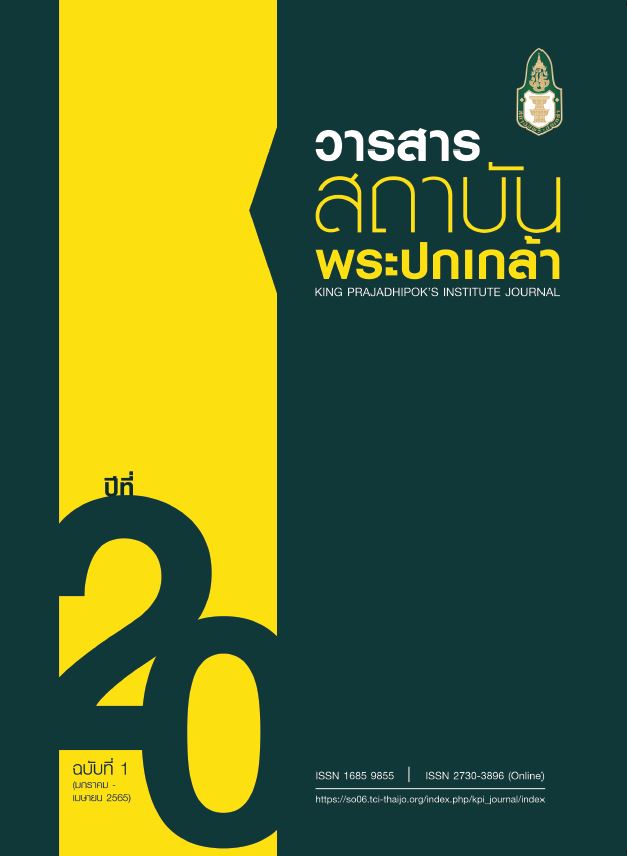Environmental Learning Management in Response to Thailand's Policy Driving Education Towards the ASEAN Community: Analyzing Policy Implementation
Main Article Content
Abstract
This article focused on environmental learning management in a school partnership program between Thailand and Indonesia in response to Thailand’s policy driving education towards the ASEAN Community in terms of building knowledge, understanding, and awareness among youth about global issues and the ASEAN Community. The article analyzed policy implementation in 1) policy design and program planning; 2) school practice and performance; and 3) good practices in promoting knowledge, understanding, and awareness of the value of the environment. Mixed-methods research was done with quantitative data collected via a survey questionnaire distributed to 23 pilot schools, with 21 schools returning it, Survey data was analyzed by percentage, mean, and standard deviation. Qualitative data was gathered through in-depth interviews with nine macro and micro level policy implementers, along with seven school visits and observations in southern Thailand. This data was analyzed by content analysis and presented in descriptive analysis form.
Results were that 1) the school partnership program between Thailand and Indonesia set an agenda promoting environmental learning as developed by the Southeast Asian Ministers of Education Organization (SEAMEO), SEAMEO Regional Open Learning Centre (SEAMOLEC), and United Nations (UN) Habitat to achieve broader content framework in response to global and ASEAN citizenship and twenty-first century adaptation; 2) pilot school environmental learning management indicated better outcomes than other program activities, especially learning about common values and gender sensitivity, and learning Bahasa Indonesia (mean=3.23, 3.05, and 2.55 respectively); and 3) pilot schools exhibited good environmental learning management promotion practice, through outreach for wider cooperation beyond school walls, especially in the civil society sector. Although perceptions of past operations have not been ideal, practitioners proposed revitalizing the program and encouraged continued action in line with central authorities who sought policy investment utilization. The program also adhered to Thailand’s leading promotion and coordination of environmental sustainability in the ASEAN Five Year Work Plan (2021-2025).
Article Details

This work is licensed under a Creative Commons Attribution-NonCommercial-NoDerivatives 4.0 International License.
@ 2020 King Prajadhipok's Institute The Government Complex Commemorating All Right Reserved.
References
ภาษาไทย
กระทรวงการต่างประเทศ. (2564). ไทย อินโดนีเซียและแคนาดาร่วมจัดการประชุมเชิงปฏิบัติการ
ASEAN Regional Forum (ARF) Workshop on Women, Peace and Security
ผ่านระบบการประชุมทางไกล. สืบค้นจากhttps://www.mfa.go.th/th/content/arfwps020364
กระทรวงการต่างประเทศ. กรมอาเซียน. (2554). อาเซียน ไฮไลท์ส 2554 (ASEAN Highlights
. กรุงเทพฯ: บริษัท เพจเมคเกอร์ จำกัด.
กระทรวงศึกษาธิการ. (2558). แผนยุทธศาสตร์อาเซียนด้านการศึกษาของกระทรวงศึกษาธิการ พ.ศ. 2558-2562. กรุงเทพฯ: กระทรวงศึกษาธิการ.
กระทรวงศึกษาธิการ. สำนักงานศึกษาธิการภาค 6. กลุ่มติดตามและประเมินผล. (2557). การศึกษาความสำเร็จของการพัฒนาการศึกษาเพื่อเข้าสู่ประชาคมอาเซียนของสถานศึกษาเขตตรวจราชการที่ 4 และ 5. ภูเก็ต: สำนักงานศึกษาธิการภาค 6.
กระทรวงศึกษาธิการ. สำนักงานศึกษาธิการภาค 11. (2556). รายงานผลการติดตามและประเมินผลการดำเนินงานตามนโยบายและยุทธศาสตร์กระทรวงศึกษาธิการ (Spirt of ASEAN) ปีงบประมาณ 2556. สกลนคร: สำนักงานศึกษาธิการภาค 11.
กระทรวงศึกษาธิการ. สำนักวิชาการและมาตรฐานการศึกษา. (2555ก). การขับเคลื่อนการศึกษาสู่
ประชาคมอาเซียน. กรุงเทพฯ: โรงพิมพ์ชุมนุมสหกรณ์การเกษตรแห่งประเทศไทย จำกัด.
กระทรวงศึกษาธิการ. สำนักวิชาการและมาตรฐานการศึกษา. (2555ข). การพัฒนาสถานศึกษาสู่
ประชาคมอาเซียน. กรุงเทพฯ: หจก. โรงพิมพ์อักษรไทย.
คำแถลงนโยบายของคณะรัฐมนตรี นางสาวยิ่งลักษณ์ ชินวัตร นายกรัฐมนตรี แถลงต่อรัฐสภา วัน
อังคารที่ 23 สิงหาคม 2554. (2554, 23 สิงหาคม). ราชกิจจานุเบกษา. เล่ม 128 ตอนพิเศษ
ง. น. 6 และ 30-36.
ศูนย์ข้อมูลและข่าวสืบสวนเพื่อสิทธิพลเมือง. (2560). อินโดนีเซียผลักดันวิชาความเท่าเทียมทางเพศ
ในโรงเรียนหลังเหตุความรุนแรงต่อผู้หญิงเพิ่มสูง. สืบค้นจาก
https://www.tcijthai.com/news/2017/09/asean/6820
สำนักงานนโยบายและแผนทรัพยากรธรรมชาติและสิ่งแวดล้อม. (2561). นโยบายและแผน
การส่งเสริมและรักษาคุณภาพสิ่งแวดล้อมแห่งชาติ พ.ศ. 2560-2579. กรุงเทพฯ:
กระทรวงทรัพยากรธรรมชาติและสิ่งแวดล้อม.
สำนักงานปลัดกระทรวงศึกษาธิการ. (2563). แผนยุทธศาสตร์กระทรวงศึกษาธิการ พ.ศ. 2563-2565. กรุงเทพฯ: กระทรวงศึกษาธิการ.
สำนักงานเลขาธิการสภาการศึกษา. (2559). รายงานผลการศึกษา การพัฒนามาตรฐานการศึกษา
ของต่างประเทศ. กรุงเทพฯ: 21 เซ็นจูรี่ จำกัด.
ภาษาอังกฤษ
Ampa Kaewkumkong & Ke Sen. (2019). Challenges of the Buffer School Policy
Implementation in the ASEAN Community era: the case of the Thailand-
Cambodia Border. Asia Pacific Journal of Education, 39(2), 237-251.
ASEAN Secretariat. (2009). ASEAN Socio-Cultural Community Blueprint. Jakarta:
ASEAN Secretariat.
ASEAN Secretariat. (2012). ASEAN 5-Year Work Plan on Education (2011-2015).
Jakarta: ASEAN Secretariat.
ASEAN Secretariat. (2016). ASEAN Socio-Cultural Community Blueprint 2025. Jakarta: ASEAN Secretariat.
ASEAN Secretariat. (2020). Initiative for ASEAN Integration (IAI) Work Plan IV
(2021-2025). Jakarta: ASEAN Secretariat.
ASEAN & SEAMEO. (2012). ASEAN Curriculum Sourcebook. Supported by the United
States Agency for International Development (USAID). Honolulu, Hawaii: East-West Center (and Nathan Associates Inc.).
Creswell, J. W. (2015). A Concise Introduction to Mixed Method Research.
Thousand Oaks, CA: SAGE Publishing.
Education Grantmakers Institute. (2011). Implementing Education Policy:
Getting from What Now? to What Works. Massachusetts: Harvard Graduate
School of Education.
Honig, M. I. (2006). Complexity and Policy Implementation: Challenges and
Opportunities for the Field. In M. I. Honig (Ed.), New Directions in Education
Policy Implementation: Confronting Complexity (pp. 1-24). Albany: State University of New York Press.
Indonesia-Thailand Partnership Activities. (2012). Rachineeburana School: Activities
on World Environment Day - Web Blog. Retrieved from
https://indothaipartnership.wordpress.com/2012/06/27/rn-activities-on-world-environment-day/
Kraemer, Daniel. (2021, November 5). Greta Thunberg: Who is the Climate Campaigner and What are Her Aims?. BBC News. Retrieved from
https://www.bbc.com/news/world-europe-49918719
Mugambwa, J., et al. (2018). Policy Implementation: Conceptual Foundations,
Accumulated Wisdom and New Directions. Journal of Public Administration
and Governance, 8(3), 211-231.
Organisation for Economic Co-operation and Development (OECD). (2018).
Implementing Education Policies: Realising Effective Change in Education.
Retrieved from http://www.oecd.org/education/implementing-education-policies-flyer.pdf
SEAMEO-SEAMOLEC. (2021). SEAMOLEC: Vision & Mission. Retrieved from
https://www.seamolec.org/seamolec
UNESCO. (2017). Education for Sustainable Development Goals: Learning
Objectives. Paris: UNESCO.
UNESCO, et al. (2016). Education 2030 - Incheon Declaration and Framework for
Action: Towards Inclusive and Equitable Quality Education and Lifelong
Learning for all. Paris: UNESCO.
Viennet, R. & Pont, B. (2017). Education Policy Implementation: A Literature
Review and Proposed Framework. OECD Education Working Papers No. 162. Paris: OECD iLibrary.
World Economic Forum. (2021). Global Gender Gap Report 2021. Geneva: The
World Economic Forum.


